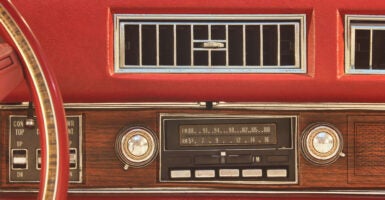In a letter to House Speaker Mike Johnson and other House leaders on Wednesday, a right-leaning think tank encouraged “prompt House passage” of legislation protecting the installation of AM radios in all new vehicles.
Numerous vehicle manufacturers—especially makers of electric vehicles—such as Ford, Tesla, and Volvo, have begun removing AM radios from their new models. The American Principles Project urged Johnson, R-La., as well as House Majority Leader Steve Scalise, R-La., and House Majority Whip Tom Emmer, R-Minn., to bring the AM Radio for Every Vehicle Act “to the House floor as soon as possible.”
According to Rep. Josh Gottheimer, D-N.J., one of the leading backers of the bill, it would “[d]irect the National Highway Traffic Safety Administration (NHTSA) to issue a rule that requires automakers to maintain AM broadcast radio in their vehicles without a separate or additional payment, fee, or surcharge.”
The American Principles Project letter notes bipartisan support for the legislation from “256 members of the House and 62 senators.” Additionally, notable figures such as radio talk-show hosts Erick Erickson, Sean Hannity, Hugh Hewitt, and Mark Levin “have expressed their support for maintaining AM radio in vehicles.”
Automakers, meanwhile, are spending millions of dollars on lobbyists in an effort to kill the bill, the Radio+Television Business Report reported Tuesday.
The letter outlines three reasons why AM radio remains important: It’s an integral part of emergency “communications infrastructure,” it’s “the lifeline of local communities,” and it’s valuable “for political discourse.”
When electric power and cell services go down, AM radio still supplies people with “free, local, and trusted news and information,” the letter states.
While nearly 4,500 AM stations operate across the United States, a collection of 77 radio stations, known as Primary Entry Points, are crucial to [the Federal Emergency Management Agency’s] ability to communicate with Americans in the event of an emergency. These stations have been hardened to withstand the most extreme circumstances. Accordingly, FEMA and the National Weather Service have built direct links with these PEP stations so that they can communicate crucial, public safety news and information during a disaster or a moment of crisis.
Heritage Action Executive Vice President Ryan Walker, a signer of the letter, said local news outlets and anchors continue to be some of the most trusted sources of information in the U.S.
“They deliver crucial updates and alerts to millions of Americans—often through AM radio stations,” Walker said. “Preserving AM radio will ensure all Americans can access emergency messages, trusted news, and impactful public discourse.”
The letter includes a quote from seven former leaders of FEMA who state, “Should EV makers continue removing AM radios from their vehicles, this vital public safety system [the National Public Warning System] will no longer function as intended.”
Aside from emergency communication, AM radio is also important for “reaching and connecting with local listeners” on the most pressing matters that might affect “their businesses, health, education, and family,” the letter says. For example, AM radio connects communities through broadcasts of “local church service[s],” local politics, and “high school football game[s].”
The letter’s authors express their concern “that nationalizing all of our information sources is a recipe for isolating Americans, who won’t know their neighbors or be able to lean on their community.”
AM radio is important for political dialogue—“the backbone of democracy,” the letter continues. “Some of the most influential Americans, from Martin Luther King Jr. to Rush Limbaugh, have broadcast on AM radio.”
Peter Parisi contributed to this report.































